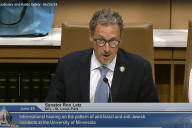You have /5 articles left.
Sign up for a free account or log in.
Our next book club selection for our Center for the Advancement of Learning (DCAL) is My Word!: Plagiarism and College Culture, by Susan Debra Blum.
Do you do academic book clubbing on your campus?
I love these discussions. Our last book club was on The Marketplace of Ideas: Reform and Resistance in the American University, by Louis Menand.
As an incentive participate, we buy the book for anyone at our institution who signs up - and the book club is open to everyone in our community.
Any suggestions for our next book?
I'd certainly suggest that you read My Word, either individually or as a group.
Blum is an anthropologist at Notre Dame, and the book is written for an academic rather than a popular audience. This approach has its pluses and minuses, as the book adheres to academic norms of providing long quotes (almost transcripts) from informants, undergrads at Notre Dame - which Blum calls "Saint U" in order to make her conclusions more generalizable.
Blum sets out to discover, utilizing her anthropological toolkit, why plagiarism seems to have moved from deviant to normative behavior amongst college students. Her concern is not with outright cheating, or the wholesale purchasing of term papers, but rather the seeming inability of students to properly cite sources and give attribution for other peoples ideas and sentences. She seeks not to judge, but to understand, preferring to think about the failure to attribute as a teachable moment. Blum's main conclusions in My Word (and I hesitate to so simplify her complex and nuanced arguments and observations) are:
- Students are mostly confused about attribution and citation, as the rules seem (to them) to be inconsistent, capricious, and illogical.
- The dominant culture that students operate in is a "remix culture", one in which cultural capital is developed and displayed by one's ability to reference and quote from popular culture when interacting with peers. Lines from "The Simpsons" (or perhaps "Jersey Shore", "The Daily Show", or "Glee") contribute to the vernacular of the college sophomore. Footnoting one's cultural references would be beyond uncool. This remix culture does not extend to books or magazines or newspapers.
- Academic norms of attribution are particularly alien to undergraduates. Learning to operate in the professorial culture of citation requires learning a new language, one at odds with the prevailing mode of communication and therefore difficult to master.
- Class work (studying, going to class, writing papers etc.) competes with an endless list of social, paid work, entertainment, and volunteer opportunities and obligations that make up the life of a college student. Campuses are "total institutions", where students find the demands on their time to be both enticing and endless. The ethos of "work hard / party hard" best captures student life, a result Blum thinks of a performance culture that has pushed kids to be active achievers since pre-school. The result is that students spend less time on class work than professors would expect and want. Papers are written with an eye towards maximum efficiency, which when combined with Google and competing deadlines, often results in un-sourced and un-attributed quotes and ideas finding there way into final drafts.
- The medium of the long-from (10 to 20 page paper) feels foreign and disconnected to the present and future work demands for almost all students. Comparable, perhaps, to speaking and reading in Latin. The disconnect between students fluency in absorbing, interacting with and creating rich media - and professors comfort with the long-form writing, is growing with each new class. Does Quentin Tarantino footnote his movies? Do the kids on Glee stop to give credit to the original artist for the songs they sing?
The solution, for Blum, is to take the time to engage issues around plagiarism and citation directly with our students. It may be necessary to craft different types of assignments, such as media mashups, ones that speak more directly to the cultural (and future employment skill concerns) of students. We should face the problem head on, and involve our students in coming up with a solution. The practice of hauling students into judicial proceedings for non-attribution is too close to the RIAA's strategy of suing individual college students, both unfair and ineffective in stemming the tide.
After reading My Word, it will be difficult to think of plagiarism through our traditional professorial lens.
What are you reading?








